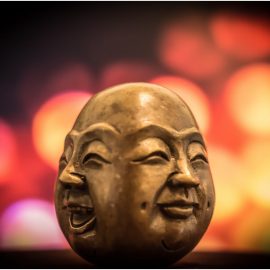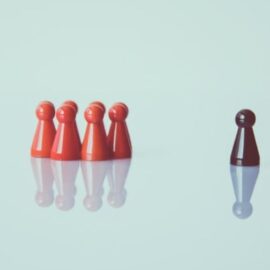

This article is an excerpt from the Shortform book guide to "Skin in the Game" by Nassim Nicholas Taleb. Shortform has the world's best summaries and analyses of books you should be reading.
Like this article? Sign up for a free trial here .
Do you consider yourself a risk-taker? How does risk-taking enrich your life?
In his book Skin in the Game, Nassim Taleb argues that risk-taking— having skin in the game—is the essence of life itself. As Taleb puts it, “real life is risk-taking.” He means this literally—by definition, a life without risk is not real life. Taleb is saying that risk defines what we consider to be reality and creates meaning by defining value.
In this article, we’ll explore Taleb’s take on risk (that is, having your skin in the game, as Taleb puts it).
Risk Determines What We Call Reality
According to Nassim Taleb, risk determines how we define reality. Movies aren’t “real” because their events have no lasting consequences. They’re entirely without risk. Taleb asserts that this is why dreams aren’t real. When we wake up, they have no lasting consequences.
Taleb brings up a thought experiment posed by philosophers: Imagine we were able to plug ourselves into an “experience machine” that could create the illusion of real life. We would see, hear, and feel a full world for an extended period of time, but it would all be implanted in our brains instantly. Would that experience be real? Taleb says no—because of the absence of risk or lasting consequences.
| The Experience Machine’s Libertarian Roots This “experience machine” thought experiment was first posed by philosopher Robert Nozick in his 1974 book Anarchy, State and Utopia. Nozick was a libertarian who wrote Anarchy, State and Utopia as a counterargument to the political philosophy of John Rawls. The experience machine is intended to support his argument that maximal pleasure for as many people as possible cannot be the end goal of society, as some people seek higher values than pleasure (and so should not have their behavior limited by the government except when necessary to preserve human rights). To prove that some people seek higher values than pleasure, Nozick argues that even if the experience machine could provide whatever pleasurable experience you could want, some people would refuse to plug into the machine, because they want things that the machine can’t give them—for example, to live up to a higher ideal in the “real” world by staying and providing for their family. |
Risk Is What Makes Us Human
Humans emotionally connect to the idea of risk and loss—it’s baked into our neurology. This is because how much we value something can be measured by how much we’re willing to risk for it.
If you want something, you’re going to need to sacrifice something to get it—for example, if you want a larger income, you need to spend time and effort to secure a raise at work or find a new job. Even then, you’ll never know for sure that you’ll get the raise you want. This is where risk comes into play—our world is inherently uncertain. Every sacrifice you make to get something you want is a risk.
In this way, risk and sacrifice are the core of the human experience. Risk is what makes us human.
| Why Do Humans Find Stories Meaningful? In his book Story, screenwriting teacher Robert McKee argues that stories “entertain when they give the audience a fresh model of life empowered with an affective meaning” [emphasis added]. Humans are on a never-ending quest for meaning. We want to figure out what will make us happy—more than that, we want to know what is worth sacrificing for. Like Taleb, McKee understands that we define value by how much we’re willing to risk, and he makes it a central tenet of his writing advice. Characters in stories need to have something to lose, or else it becomes obvious that nothing in the story matters, and the audience gets bored. Stories with stakes are engaging because they have a chance of showing us a new situation where meaning can be found. |
The Origin of Value
So, skin in the game is a reflection of value, but this still doesn’t answer the question: Why do we value what we value?
Taleb frames everything we are, everything we do, everything we risk, as a means toward one end: the survival of the human race. Everything we feel an emotional attachment to is, somehow, intended to motivate us to keep the human collective alive.
All of society is one group effort to help us all live for as long as possible. We build houses to protect us from nature, we build cities to help us collaboratively fulfill our survival needs, and we create technology to help us live longer and easier lives.
In order to achieve these goals, each of us needs to make countless sacrifices over the course of our lives—it takes sacrifice to build a career that benefits society and to forge mutually fulfilling relationships. Skin in the game is what it means to be human because being human means being wired to contribute to the collective’s survival.
| Irrational Beauty Taleb doesn’t comment on beauty or art—the things we value highly, but don’t seem to have much practical value when it comes to survival. Immanuel Kant defined beauty as that which is pleasurable, yet not a means to another end. That is, not a biological pleasure like food or sex (which would, by Kant’s definitions, be “agreeable”) nor a conceptual pleasure that makes you happy because you rationally know it will help you get what you want, like a house or a car (which Kant would call “good”). Music, art, and aesthetics are “beautiful.” In this way, Kant defines beauty specifically as what Taleb would call “irrational,” as it seems to serve no greater purpose. If that’s the case, how would Taleb explain how much humans value beauty? Artists often bear tremendous risk and sacrifice in order to create something beautiful, showing, by Taleb’s definition, that they value it, despite it not contributing to humanity’s survival. By his logic, Taleb would have to argue that beauty serves some practical purpose for humanity that we can’t easily identify. For example, beauty could merely be an intense drive for pattern detection that motivates us to discover subtle information valuable for survival. An unromantic way of looking at the world, for sure. |
Redefining Rationality
With this conception of humanity in mind, Taleb redefines what is “rational.” Instead of defining rational beliefs as those that align with our understanding of the way the world works, Taleb argues that we should see any belief that enables survival as rational.
It’s impossible to judge the rationality of beliefs using logic and abstraction. The universe is too incomprehensibly complex—there will always be unknown factors that could lead us to faulty conclusions. Even if we did possess complete knowledge of the universe, no one on Earth would be able to effectively process that information into a usable mental model. We need a different way to determine the rationality of beliefs.
To this end, Taleb believes in a “natural selection” of beliefs: Any belief that has survived for several generations is rational because those who held that belief have survived and chosen to pass it down. This is an extension of the Lindy effect—time is the only impartial judge of quality. In this view of rationality, even beliefs that are distorted or outright untrue can be “rational” if they cause us to behave in a way that helps us survive.
| Critique of Taleb’s Rationality This definition of rationality is a recurring point of contention among Skin in the Game’s critics. If we were to totally refrain from abstract judgment of beliefs and instead wait for them to play out over years to see if they survive, truly irrational beliefs could cause massive amounts of suffering—as an extreme example, if the Allied Forces had allowed Nazi Germany’s ideas to play out, they could have destroyed the world. It’s necessary to label some beliefs as irrational.It’s impractical to assume that all new beliefs are inferior to traditional ones. Taleb’s assertion that “everything that survives survives for a reason” doesn’t necessarily prove his more extreme point that every belief that has survived has aided that survival. Sometimes, beliefs survive despite hurting our chances of survival—people believed in medicinal bloodletting for thousands of years. Additionally, the world is constantly changing, and we have reason to believe that it’s changing faster and faster. Even if a belief has been successful at promoting survival for the past several millennia, this doesn’t 100% prove that it will continue to do so forever—this is the main idea in Taleb’s own The Black Swan. The world is inherently unpredictable and can change in unpredictable ways. |

———End of Preview———
Like what you just read? Read the rest of the world's best book summary and analysis of Nassim Nicholas Taleb's "Skin in the Game" at Shortform .
Here's what you'll find in our full Skin in the Game summary :
- Why having a vested interest is the single most important contributor to human progress
- How some institutions and industries were completely ruined by not being invested
- Why it's unethical for you to not have skin in the game






